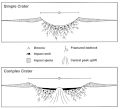H. Jay Melosh | |
|---|---|
 | |
| Born | June 23, 1947 |
| Died | September 11, 2020 (aged 73) |
| Citizenship | United States |
| Education | Princeton Caltech |
| Known for | Impact Cratering Studies |
| Awards | Barringer Medal G K Gilbert Award |
| Scientific career | |
| Fields | Geophysics |
| Institutions | Purdue University |
| Website | eaps.purdue.edu/people/faculty-pages |
H. Jay Melosh (June 23, 1947 – September 11, 2020)[1] was an American geophysicist specialising in impact cratering. He earned a degree in physics from Princeton University and a doctoral degree in physics and geology from Caltech in 1972.[2] His PhD thesis concerned quarks.[3][4] Melosh's research interests include impact craters, planetary tectonics, and the physics of earthquakes and landslides. His recent research includes studies of the giant impact origin of the Moon, the Chicxulub impact that is thought to have extinguished most dinosaurs, and studies of ejection of rocks from their parent bodies. He was active in astrobiological studies that relate chiefly to the exchange of microorganisms between the terrestrial planets (a process known as panspermia or transpermia[5]).
Melosh was a member of the American Geophysical Union, Geological Society of America, Meteoritical Society, American Astronomical Society (Division of Planetary Sciences,) and the American Association for the Advancement of Science.[2] He was the recipient of the Barringer Medal of the Meteoritical Society for his work on the physics of impact, and of the G. K. Gilbert Award from the Geological Society of America. He was elected to the National Academy of Sciences in 2003.[6]
YouTube Encyclopedic
-
1/1Views:345
-
Jay Melosh - 10/06/2011- Workshop on Mathematics in the Geosciences
Transcription
Awards and honors
- Asteroid 8216 Melosh is named in his honor.
- The American Geophysical Union 2008 Harry H. Hess Medal - for “outstanding achievements in research in the constitution and evolution of Earth and sister planets.”[7]
Publications
- H. J. Melosh (1989). Impact cratering: A geologic process. Oxford University Press. Bibcode:1989icgp.book.....M. ISBN 0-19-510463-3. LCCN 88-5353. OCLC 17649090. OL 7387860M. Wikidata Q105670571.
- Planetary Surface Processes, Cambridge University Press, 2011, (ISBN 0-52-151418-5)
References
- ^ "H. Jay Melosh".
- ^ a b "Curriculum Vitae" (PDF). Purdue University. Retrieved June 24, 2016.
- ^ Melosh, H. Jay (1973). Quarks: currents and constituents (phd). California Institute of Technology. doi:10.7907/102C-A509. Retrieved September 16, 2020.
- ^ Melosh, H. J. (1974). "Quarks: Currents and constituents" (PDF). Physical Review D. 9 (4): 1095–1112. Bibcode:1974PhRvD...9.1095M. doi:10.1103/PhysRevD.9.1095. Retrieved September 16, 2020.
- ^ "Swapping Rocks - Exchange of Surface Material Among the Planets". Australian Spaceguard Survey. Retrieved June 23, 2016.
- ^ U A News[usurped]
- ^ "2008 Harry H. Hess Medal Winner". American Geophysical Union. Retrieved June 23, 2016.


